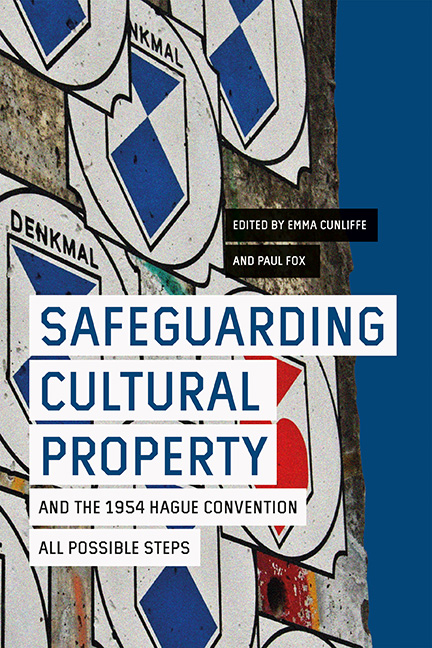Book contents
- Frontmatter
- Contents
- List of Illustrations
- List of Contributors
- Plate Section
- Acknowledgements
- List of Abbreviations
- Preface: The Blue Shield and the Protection of the World's Cultural Property – Preparing in Peace for Conflict
- Part I Safeguarding – Reassessing the Field
- Part II Historical Perspectives
- Part III Current Issues in Legal Implementation
- Part IV The Hague Convention in Practice Today: Tools and Approaches
- Appendix 1 The Hague Convention for the Protection of Cultural Property in the Event of Armed Conflict with Regulations for the Execution of the Convention 1954
- Appendix 2 Regulations for the Execution of the Convention for the Protection of Cultural Property in the Event of Armed Conflict
- Appendix 3 Resolutions of the 1954 Hague Conference
- Appendix 4 Second Protocol to the Hague Convention of 1954 for the Protection of Cultural Property in the Event of Armed Conflict 1999
- Appendix 5 Additional Protocols (1977) to the Geneva Conventions (1949) (Extracts)
- Index
- HERITAGE MATTERS
1 - All Possible Steps? Revisiting Safeguarding in the 1954 Hague Convention
Published online by Cambridge University Press: 26 May 2022
- Frontmatter
- Contents
- List of Illustrations
- List of Contributors
- Plate Section
- Acknowledgements
- List of Abbreviations
- Preface: The Blue Shield and the Protection of the World's Cultural Property – Preparing in Peace for Conflict
- Part I Safeguarding – Reassessing the Field
- Part II Historical Perspectives
- Part III Current Issues in Legal Implementation
- Part IV The Hague Convention in Practice Today: Tools and Approaches
- Appendix 1 The Hague Convention for the Protection of Cultural Property in the Event of Armed Conflict with Regulations for the Execution of the Convention 1954
- Appendix 2 Regulations for the Execution of the Convention for the Protection of Cultural Property in the Event of Armed Conflict
- Appendix 3 Resolutions of the 1954 Hague Conference
- Appendix 4 Second Protocol to the Hague Convention of 1954 for the Protection of Cultural Property in the Event of Armed Conflict 1999
- Appendix 5 Additional Protocols (1977) to the Geneva Conventions (1949) (Extracts)
- Index
- HERITAGE MATTERS
Summary
The High Contracting Parties…
Being of the opinion that such protection cannot be effective unless both national and
international measures have been taken to organize it in time of peace;
Being determined to take all possible steps to protect cultural property;
Have agreed upon the following provisions:
Preamble, 1954 Hague ConventionIn a significant advance on previous international legislation protecting cultural property (CP) in armed conflict, the drafters of the 1954 Hague Convention for the Protection of Cultural Property in the Event of Armed Conflict (the ‘Convention’) widened the responsibility for its protection.
Article 2 declares: ‘The protection of cultural property shall comprise the safeguarding of and respect for such property’.
While the concept of respect for CP, detailed in the Convention in Article 4, was broadly well established in law as a military concern during operations, armed forces no longer bore sole responsibility. Although earlier draft legislation included the concept, it was never formally adopted. The new legislation, which entered into force on 7 August 1956, incorporated lessons learned from two world wars and the Spanish Civil War of 1936–39: it recommended safeguarding measures to be prepared in advance of conflict, cooperatively developed between civil and defence authorities. Furthermore, it was no longer only the responsibility of the warring states: it was ‘important that this heritage should receive international protection’ (Preamble).
It is this protection – enabled by national and international measures of safeguarding – that is the focus of this volume.
In his Review of the Convention and its First Protocol (1954), Patrick Boylan (1993) examined its implementation, its effectiveness, and the potential for future development. At that time, 82 states parties had ratified or acceded to the Convention. He concluded that despite
apparent failures over the past 40 years, The Convention, Regulations and Protocol … are still entirely valid and realistic as international law, and remain fully applicable and relevant to present circumstances. The problem is essentially one of failure in the application (Boylan 1993, 7).
He made recommendations to states parties, the first of which was to implement the practical elements of the Convention, taking a cross-sector, integrated approach to planning in peacetime.
- Type
- Chapter
- Information
- Safeguarding Cultural Property and the 1954 Hague ConventionAll Possible Steps, pp. 3 - 36Publisher: Boydell & BrewerPrint publication year: 2022



